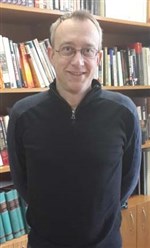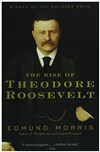Edward Kohn, Assistant Professor, Departments of AMER and HIST
BY MELİS ERDEM (ARCH/II)
 I have two ways of answering the question of what book has influenced me most. One is the typical answer that a lot of Bilkent instructors probably give you. There’s a book that I read as a graduate student; it’s Edmund Morris’s “The Rise of Theodore Roosevelt,” first published in 1979. This is a biography of the 26th president of the United States. It’s a beautifully written book, and the reader can’t help but become interested in the topic.
I have two ways of answering the question of what book has influenced me most. One is the typical answer that a lot of Bilkent instructors probably give you. There’s a book that I read as a graduate student; it’s Edmund Morris’s “The Rise of Theodore Roosevelt,” first published in 1979. This is a biography of the 26th president of the United States. It’s a beautifully written book, and the reader can’t help but become interested in the topic.
On the one hand, Morris’s book pushed me to what has been my field of study for the past ten years: looking at Theodore Roosevelt. At the same time—and here’s the second part of my answer—he has a certain interpretation about the life of Theodore Roosevelt that I don’t necessarily agree with. Roosevelt was born in New York City, the only American president ever to be born there. He grew up in New York and his political career was in New York, but he spent a little bit of time in the American West. And for Morris, that is one of the most important things about Roosevelt: that he was as much as cowboy in the West as he was anything else. I lived in New York for a time, and I remember when I was preparing to teach one of the first classes I ever taught, after getting my PhD. I was reading Morris’s book about Roosevelt the cowboy, and one day I was walking my dog along the East River in Manhattan with all the buildings towering above me, and I wondered how anybody could really think that a man who was born and raised and had his career in Manhattan of all places, in the biggest city in the US, was actually somehow a cowboy.
And this led to my very first articles and eventually the several books that I have written on Theodore Roosevelt, trying to de-emphasize the interpretation of so many historians and biographers like Morris that he was a cowboy. No, this guy was a lifelong New Yorker; he was an urban progressive and an urban politician, so you have to take him out of that Western context and place him back where he belongs, in New York City.
I was very impressed that Morris made history and Theodore Roosevelt come alive with his beautiful writing, showing that history  doesn’t have to be boring, that it doesn’t have to be just dates and battles, that you can in fact write lyrically about history and tell it as a compelling story, one that people might listen to. But at the same time, I disagreed with him enough that it impelled me to look at different aspects of Theodore Roosevelt.
doesn’t have to be boring, that it doesn’t have to be just dates and battles, that you can in fact write lyrically about history and tell it as a compelling story, one that people might listen to. But at the same time, I disagreed with him enough that it impelled me to look at different aspects of Theodore Roosevelt.
Theodore Roosevelt was actually Theodore Roosevelt Jr.; his father was Theodore Roosevelt Sr. And his father had a tremendous influence on him. So even after his father died—which happened when Roosevelt was only a university student—he was kind of like a ghost hovering in the background for the rest of his son’s life. Even when Roosevelt was president, he would say, “I’ve never made a decision without thinking about what my father would have done.” And while Roosevelt was still a student, he wrote these diaries, which I’ve just published. In them, he wrote about the death of his father and said, “There is no way I can ever be such a great man as my father.”
The last ten years of my life have been dedicated to studying Theodore Roosevelt. And my career in the past ten years has gone in directions that I don’t think I could have foreseen had I not read this book and started studying Roosevelt. My work in this area resulted in three books, and one of them in particular, “Hot Time in The Old Town,” which came out in 2010 and was about a heat wave in New York City in 1896, got a lot of attention. I was on “The Daily Show with Jon Stewart” five years ago because of this book. I was interviewed all over the place, and the book was reviewed in the Wall Street Journal. So, I think it made me a much better-known American historian back in the US and got me a lot of attention that I would probably never have gotten otherwise.
